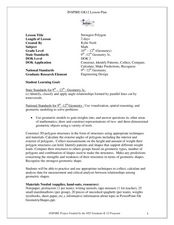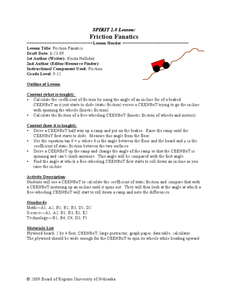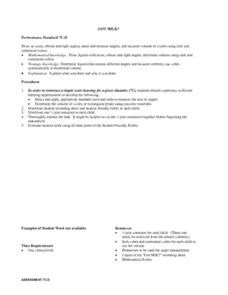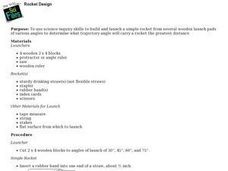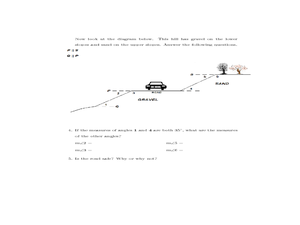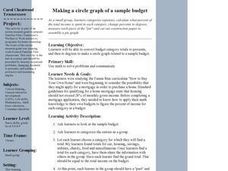Curated OER
Problem Solving Using Power Polygons
Students investigate geometric shapes by creating figures on a plane. In this polygon lesson, students complete a worksheet based on the angles in a power polygon. Students identify the different types of polygons and define their...
Curated OER
Tessellation Trial and Error
In this interactive instructional activity, students review attributes of equilateral polygons. They are introduced to the concept of a tessellation. Using protractors and pre-cut shapes, students arrange a variety of tiles to create...
Curated OER
Strongest Polygon
Students define and identify shapes by name. In this geometry lesson, students construct, identify and compare polygons based on the number of sides. They classify each shape based on their angle sum theorem.
Curated OER
Friction Fanatics
Student and compare the three types of friction. In this physics lesson, students determine the coefficient of friction using the CEENBoT. They investigate how friction changes as the angle of the incline changes.
Curated OER
Leaping Lemurs! How far can you jump?
Learners watch a segment of the PBS video which show the lemurs' ability to jump. In pairs, students collect measurement data involving each other's length of a standard step, a standing broad jump, and a long jump. They record their...
Curated OER
Surveying: 19 Chains and 50 Links
Through an interdisciplinary lesson, emerging engineers explore the history of surveying systems. After discussing various systems, they perform surveys on printable pages. Using their geometric skills, they physically stake out plots...
Curated OER
Graph Both Crusts
Fourth graders calculate the angles and construct a pie graph of the percentages of the elements in the continental and oceanic crusts. Then they analyze the results. They can be assigned the task of researching the percentages.
Curated OER
Got Milk?
Learners measure the angles of a milk carton. They identify and label acute, right, and obtuse angles. Using appropriate tools, students determine the volume of a cube or a rectangular prism. Learners complete worksheets to...
Curated OER
The Distance to an Unapproachable Point
Students use geometry or trigonometry to measure the distance of a far off point. They verify their measurements using a tape measure to check their work.
Curated OER
Learning Lesson: The Shadow Knows II
Young scholars discover and practice how to calculate the circumference of the Earth. They measure the length of their shadows and use the distance they are away from the equator to complete the calculations. They discuss winter or...
Curated OER
Math: Arcs and Chords
Students draw diagrams demonstrating how it is possible to two central angles to be congruent and their minor arcs are not congruent. In groups, they illustrate theorems with their constructed circles, create diameters of circles that...
Curated OER
Volcanoes: Piles of Fire
Students investigate how particle size affects the angle of a volcano's slope.
Curated OER
Astronomy With a Stick
High schoolers find the altitude of the Sun at 10 A.M., at solar noon, and at 2 P.M. by measuring the height of the gnomon and the length of the shadow at each time. They record the measurements in their notebooks for later conversion.
Curated OER
Rocket Design: Aerodynamics, Trajectories
Students use science inquiry skills to build and launch a simple rocket, from several wooden launch pads of various angles, to determine what trajectory angle carry a rocket the greatest distance.
Curated OER
Speed Is the Key
Learners design and build a model downhill ski course that proves to be the fastest course at the Finish Line. They apply what they explore angles, slope, speed, and surface conditions to find the fastest course in the US.
National Security Agency
Classifying Triangles
Building on young mathematicians' prior knowledge of three-sided shapes, this lesson series explores the defining characteristics of different types of triangles. Starting with a shared reading of the children's book The Greedy...
National Security Agency
Partying with Proportions and Percents
Examine ratios and proportions in several real-world scenarios. Children will calculate unit rates, work with proportions and percentages as they plan a party, purchase produce, and take a tally. This lesson plan recommends five...
Curated OER
Vector Lab
Here is a math lab that helps young mathematicians understand the real-life meaning for vector addition. By building a model using spring scales and washers as weight, and then calculating the vector addition using two different methods,...
Curated OER
The Tipping Point
Young scholars rewrite word problems and solve using math. In this word problem lesson, students gather data and observe the data. They relate this process to the scientific method and math. They review their data to be able to answer...
Curated OER
Quilt Squared
Students study West Virginia quilts. For this mathematics lesson, students use symmetry, geometric shapes, and patterns to create their own quilt square.
Curated OER
Only the Shadow Knows
Middle schoolers become familiar with the causes for formation of shadows. They create shadows, compare the size and shape of the shadow with the actual object, engage in shadow play theatre, and discover what happens to shadows when...
Curated OER
Similarity and Congruence
Students determine that two figures are similar or congruent by
investigating figures that are similar and figures that are congruent. They prove that two figures are similar or congruent by using definitions,
postulates, and theorems.
Curated OER
Making a Circle Graph of a Sample Budget
Young scholars examine a sample budget and categorize the entries as a group. Then in small groups they convert budget category totals to percents and degrees to make a circle graph related to a sample budget.
Curated OER
Graphing
Students collect data to create different types of graphs-line, pie, and bar graphs. They use StarOffice 6.0 to create graphs.


